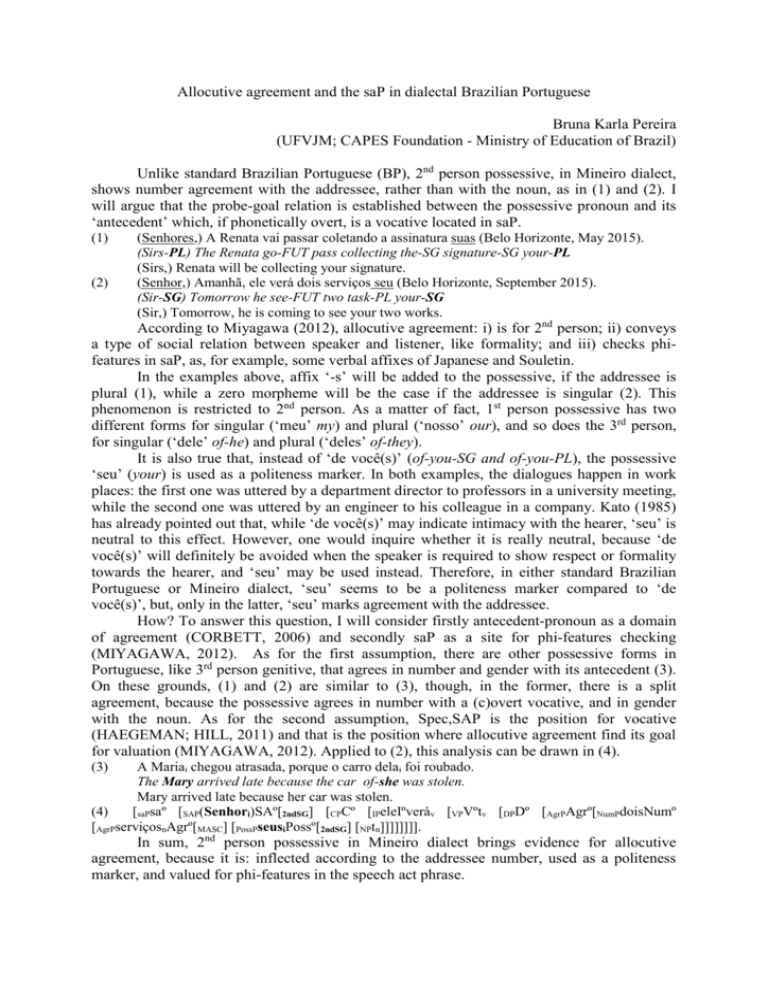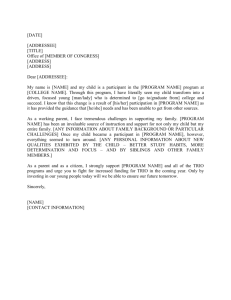Abstract.
advertisement

Allocutive agreement and the saP in dialectal Brazilian Portuguese Bruna Karla Pereira (UFVJM; CAPES Foundation - Ministry of Education of Brazil) Unlike standard Brazilian Portuguese (BP), 2nd person possessive, in Mineiro dialect, shows number agreement with the addressee, rather than with the noun, as in (1) and (2). I will argue that the probe-goal relation is established between the possessive pronoun and its ‘antecedent’ which, if phonetically overt, is a vocative located in saP. (1) (2) (Senhores,) A Renata vai passar coletando a assinatura suas (Belo Horizonte, May 2015). (Sirs-PL) The Renata go-FUT pass collecting the-SG signature-SG your-PL (Sirs,) Renata will be collecting your signature. (Senhor,) Amanhã, ele verá dois serviços seu (Belo Horizonte, September 2015). (Sir-SG) Tomorrow he see-FUT two task-PL your-SG (Sir,) Tomorrow, he is coming to see your two works. According to Miyagawa (2012), allocutive agreement: i) is for 2nd person; ii) conveys a type of social relation between speaker and listener, like formality; and iii) checks phifeatures in saP, as, for example, some verbal affixes of Japanese and Souletin. In the examples above, affix ‘-s’ will be added to the possessive, if the addressee is plural (1), while a zero morpheme will be the case if the addressee is singular (2). This phenomenon is restricted to 2nd person. As a matter of fact, 1st person possessive has two different forms for singular (‘meu’ my) and plural (‘nosso’ our), and so does the 3rd person, for singular (‘dele’ of-he) and plural (‘deles’ of-they). It is also true that, instead of ‘de você(s)’ (of-you-SG and of-you-PL), the possessive ‘seu’ (your) is used as a politeness marker. In both examples, the dialogues happen in work places: the first one was uttered by a department director to professors in a university meeting, while the second one was uttered by an engineer to his colleague in a company. Kato (1985) has already pointed out that, while ‘de você(s)’ may indicate intimacy with the hearer, ‘seu’ is neutral to this effect. However, one would inquire whether it is really neutral, because ‘de você(s)’ will definitely be avoided when the speaker is required to show respect or formality towards the hearer, and ‘seu’ may be used instead. Therefore, in either standard Brazilian Portuguese or Mineiro dialect, ‘seu’ seems to be a politeness marker compared to ‘de você(s)’, but, only in the latter, ‘seu’ marks agreement with the addressee. How? To answer this question, I will consider firstly antecedent-pronoun as a domain of agreement (CORBETT, 2006) and secondly saP as a site for phi-features checking (MIYAGAWA, 2012). As for the first assumption, there are other possessive forms in Portuguese, like 3rd person genitive, that agrees in number and gender with its antecedent (3). On these grounds, (1) and (2) are similar to (3), though, in the former, there is a split agreement, because the possessive agrees in number with a (c)overt vocative, and in gender with the noun. As for the second assumption, Spec,SAP is the position for vocative (HAEGEMAN; HILL, 2011) and that is the position where allocutive agreement find its goal for valuation (MIYAGAWA, 2012). Applied to (2), this analysis can be drawn in (4). (3) A Mariai chegou atrasada, porque o carro delai foi roubado. The Mary arrived late because the car of-she was stolen. Mary arrived late because her car was stolen. (4) [saPsaº [SAP(Senhori)SAº[2ndSG] [CPCº [IPeleIºveráv [VPVºtv [DPDº [AgrPAgrº[NumPdoisNumº [AgrPserviçosnAgrº[MASC] [PossPseusiPossº[2ndSG] [NPtn]]]]]]]]. In sum, 2nd person possessive in Mineiro dialect brings evidence for allocutive agreement, because it is: inflected according to the addressee number, used as a politeness marker, and valued for phi-features in the speech act phrase.











